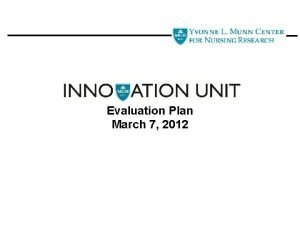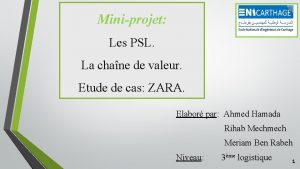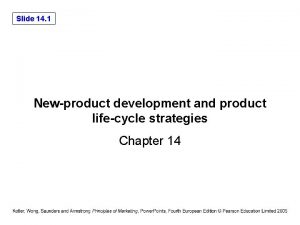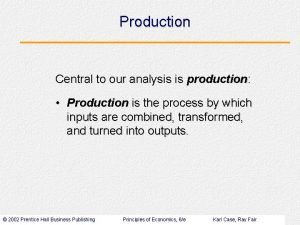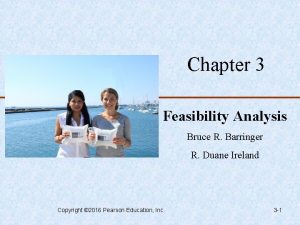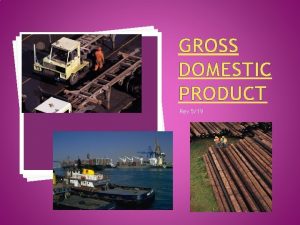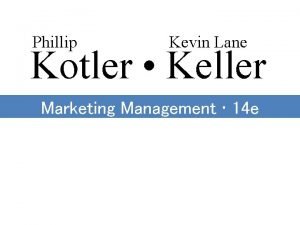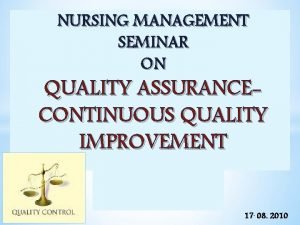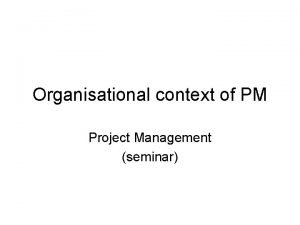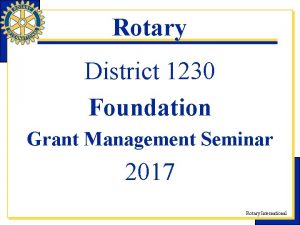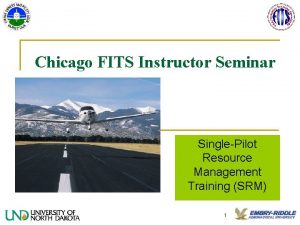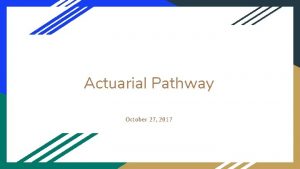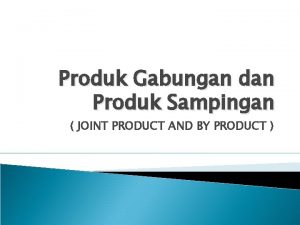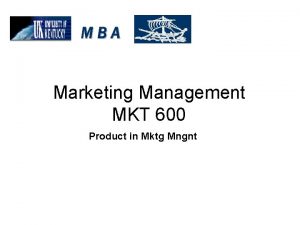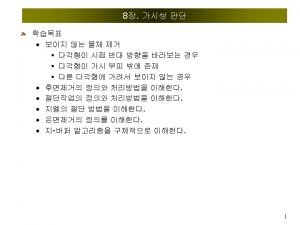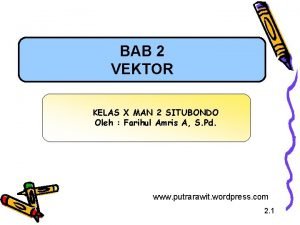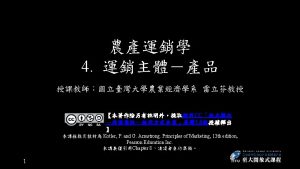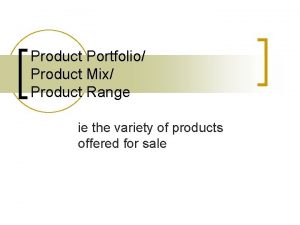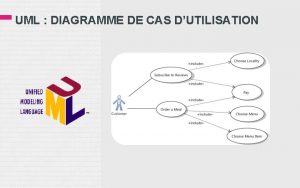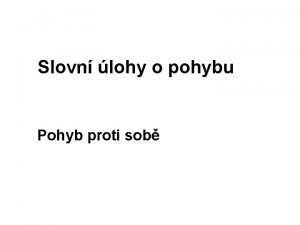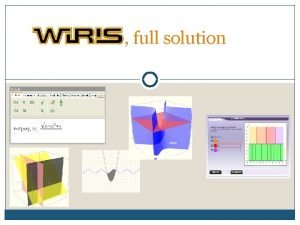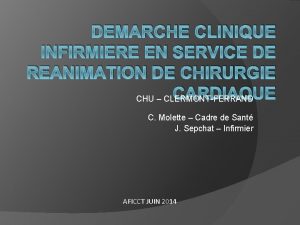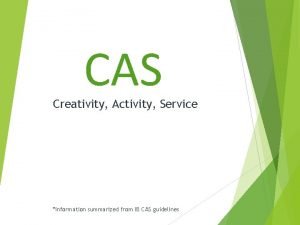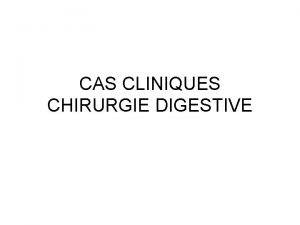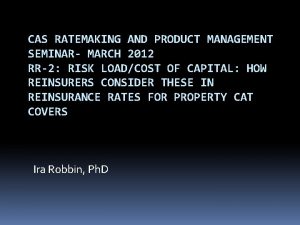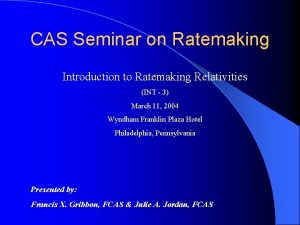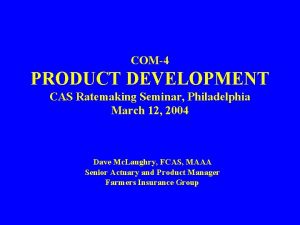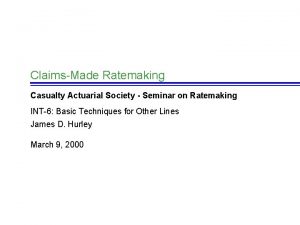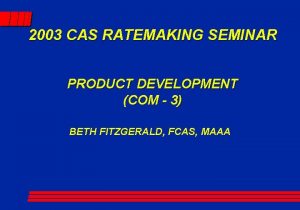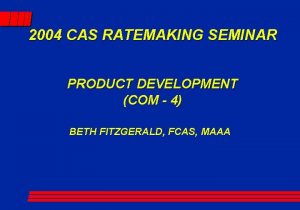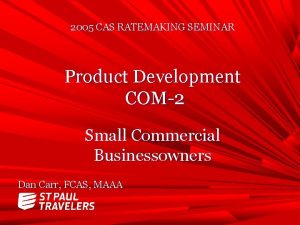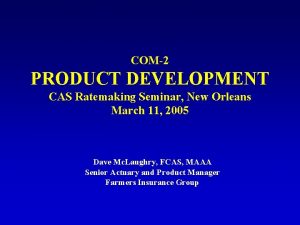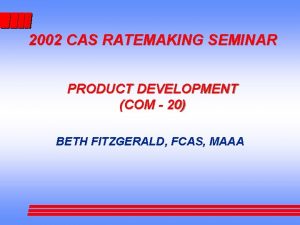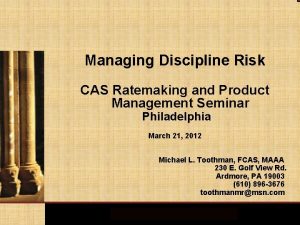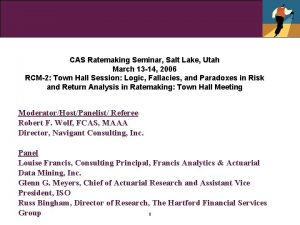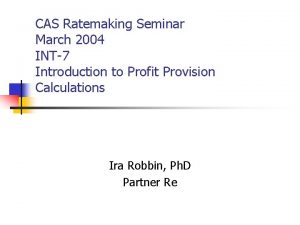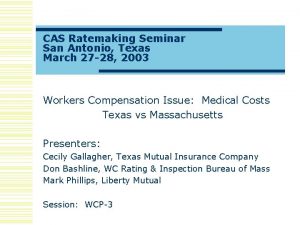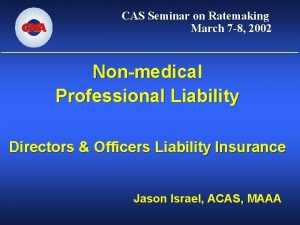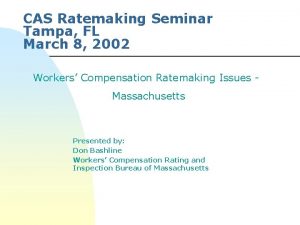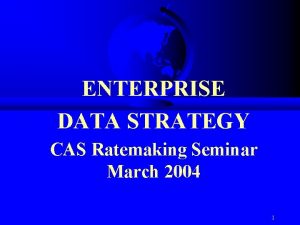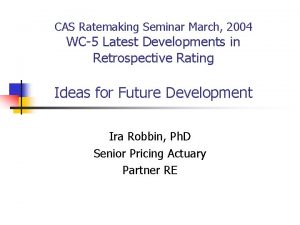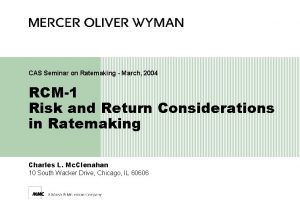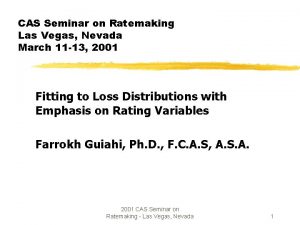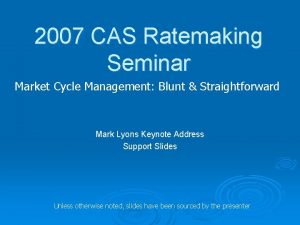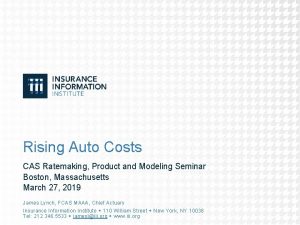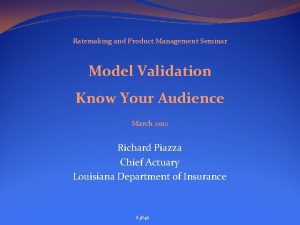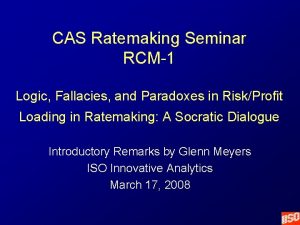CAS RATEMAKING AND PRODUCT MANAGEMENT SEMINAR MARCH 2012










































![43 Risk-Adjusted Rate r. A = rf + b (E[rm] – rf ) b 43 Risk-Adjusted Rate r. A = rf + b (E[rm] – rf ) b](https://slidetodoc.com/presentation_image_h2/22aa47bf96b94e5c5a6854538f37daa0/image-43.jpg)



- Slides: 46

CAS RATEMAKING AND PRODUCT MANAGEMENT SEMINAR- MARCH 2012 RR-1: RISK AND RETURN CONSIDERATIONS IN RATEMAKING- CALCULATING THE PROFIT PROVISION Ira Robbin, Ph. D Senior Vice-President Corporate Actuary Endurance Services Limited

2 Ground Rules The purpose of this session is to educate actuaries in various methods used to compute the underwriting profit provision. There will be no discussion of the adequacy of the premium charge for any particular consumer or particular class of consumers. All attendees should scrupulously follow antitrust guidelines. 2

3 CAS Antitrust Notice The Casualty Actuarial Society is committed to adhering strictly to the letter and spirit of the antitrust laws. Seminars conducted under the auspices of the CAS are designed solely to provide a forum for the expression of various points of view on topics described in the programs or agendas for such meetings. Under no circumstances shall CAS seminars be used as a means for competing companies or firms to reach any understanding – expressed or implied – that restricts competition or in any way impairs the ability of members to exercise independent business judgment regarding matters affecting competition. It is the responsibility of all seminar participants to be aware of antitrust regulations, to prevent any written or verbal discussions that appear to violate these laws, and to adhere in every respect to the CAS antitrust compliance policy. 3

4 Disclaimers No statements of the Endurance corporate position will be made or should be inferred. While some methods may be similar to methods promulgated by regulatory authorities, practitioners should follow actual regulatory instructions. While some methods to be discussed are similar to methods in the presenter’s Study Note on the CAS Syllabus, students should consult the Study Note for exact details. 4

Cautions Examples are for illustrative purposes only. Do not use the results from any example in realworld applications. The profit load indicated from a model often depends critically on the assumptions and parameters. For ease of presentation, assumptions have been greatly simplified and hypothetical parameters have been selected. There may be a quiz at the end – so pay attention! 5

6 Overview UW Profit Basics Overview of Different Methods Corporate and Regulatory Contexts Offset Formulas ROE Models DCF and Risk-Adjusted DCF Conclusion 6

Different Types of UW Profit Actual Achieved Booked to Date vs Ultimate PY, AY, CY Direct, Gross, Ceded, Net Stat vs GAAP Provision in Manual Rate Indicated, Filed, Approved Per Risk vs Book of Business Provision in Charged Premium Competition and Market cycles 7

UW Profit: Basic Equations U = P-L-X = UPM*P L = Loss + LAE X = Expense including premium tax CR = (L+X)/P= 1 - UPM of – 100% yields CR =200% X = FX +VXR*P FX = Fixed expense VXR = Variable expense ratio P= (L+FX)/(1 -VXR-UPM) 8

UW Profit Provision Chart 9

10 UPM Formula Examples L=50 FX=30 VXR = 15% UPM = 5% • VXR=15% UPM = -1% 10

11 UPM Calculation Approaches Investment Income Adjustment Start with traditional profit loads Adjust for investment income Total Return Select target return and determine capital Compute total return on capital Find profit needed to hit target return Economic Components Needed premium is sum of discounted components Risk reflected in discounting 11

UW Profit Provision Methods 12

What is the right Underwriting Profit Provision ? 13

14 Right Method Depends on Context Regulatory Philosophy of regulation �State controlled vs free market approaches Personal Lines and WC vs Commercial Prior approval/File and use/Use and file Corporate UPM targets by LOB or Business Segment Pricing for target return net of risk over cycle Pricing hurdle 14

15 Recap of UW Profit Regulation • 1920’s – 1970’s: Low interest era – No consideration of investment income – 5. 0% UPM for most lines (2. 5% for WC) • 1970’s – 90’s: High rate era – Investment income offsets – CAPM, DCF and Risk-Adjusted DCF – IRR on Equity Flows and PVI/PVE • Late 1990 s-2000 -2010: Low rate era – – Less interest in Inv Income regulation Lower loss costs Competitive rate reductions More open competition 15

16 CY Investment Income Offset (State X) UPM 0 = Traditional UPM IIOffset = Investment Income Offset – PHSF = Policyholder supplied funds – Interest rate after-tax from CY inv inc earned – Actual portfolio mix of invested assets 16

17 Policyholder Supplier Funds Two Components UEPR net of Pre-Paid Acquisition Cost Reduce for Receivables PLR = Permissible Loss Ratio CY ratio of L+LAE Reserves to Incurred 17

CY II Offset- Example UEPR LRES 400 1, 200 RECV UPM 0 260 5. 0% Earned Prem Inc’d Loss+LAE 1, 000 800 PPACQR 10. 0% PLR 60. 0% After-tax 2. 0% Yield PHSF = ((400/1000)·(1 -. 1)-. 26) +. 6· 1. 5 =1. 00 UPM =. 05 -. 02· 1. 00 = 3. 0% 18

Offset for PV Loss Differential UPM 0 = Traditional UPM – – PLR = Permissible Loss ratio x = Loss pattern for review LOB x 0 = Loss pattern for reference LOB PV using risk-free new money rate after-tax 19 19

PV Differential Offset- Example PV(REF Loss Pattern) PV(REV Loss Pattern) Risk-free New Money Rate after tax 99. 0% 95. 0% 2. 0% PLR Traditional UPM PVDELLR = (. 99 -. 95)*. 60 = 2. 4% UPM =. 050 -. 024 = 2. 6% 60. 0% 5. 0% 20 20

CY ROS Equation 21

ROS Decomposition Premium to Surplus Ratio 22

23 CY ROS • ROE vs ROS • GAAP vs STAT – Going-concern vs Solvency – STAT defined by state regulation • Calendar Yr vs Policy Yr – ROE is CY – Past decisions impact this CY – Ratemaking is PY and prospective 23

24 Surplus in ROS Equation S = Target Statutory Surplus S = P/l l = Premium-to-Surplus leverage ratio l varies by LOB Equity vs Surplus 24

Solve for UPM 25

UPM to Hit CY ROS- Example 26

27 IRR on Equity Flows Internal Rate of Return on Individual Policy or Book of Business or LOB Can be used in regulatory or corporate contexts Equity flow: flow of $ between an equity investor and the insurance company Model prospective equity flows for hypothetical insurance company writing one policy Use accounting rules, capital requirements, and other assumptions to derive income and surplus each time period. EQF = INC – DS 27

Equity Flow Diagram 28

29 Capital Set Surplus = Required Capital Need to specify amount and duration in model Reflect UW, CAT, and Reserving risk Not an Actual Allocation of Capital Regulatory: RBC, RDS, Solvency II Rating Agencies: S&P, A. M. Best, etc. Book of Business Variation Should high layer excess casualty and primary low limit casualty use the same Other Liab factors? Individual Large Risk or Treaty Variation Adjust for treaty features ( e. g. reinstatements, agg caps) 29

30 Income and Cash Flow UW Gain = EP –Inc. Loss –Inc. Expense Defined by accounting rules Does not depend on UW cash flows Inv Inc = II on Invested Assets- Recvbl’s -Recovs Assets = Reserves + Surplus Balance sheet must balance Amounts defined by accounting rules UW Cash flows impact Invested Assets 30

Single Policy Company: UW Income and Cash Flow 31

Single Policy Company: Assets and Investment Income 32

Single Policy Company: Equity Flow and IRR 33

IRR • Given flows , xt , IRR is the interest rate, y, (if it exists) which solves: IRR extends the concept of the interest rate on a loan to a more general situation 34

IRR on Equity Flows Typical EQ Flows in P/C insurance First flow is negative Later flows are positive One sign change IRR on EQ Flow well-defined Solve for premium to hit IRR target 35

PVI/PVE ROE on Individual Policy, Book of Business or LOB Can be used in regulatory or corporate contexts Equity Balance • Generalizes ROE = Income/Equity to apply to multiyear model – PV of income at end of year 1 – PV of balance sheet account (Equity ‘Balance) 36

Single Policy Company: PVI/PVE 37

PVI/PVE Approximation Compute PVI /PVE as sum of: PV of UW Cash Flows at immunized risk-free rate + Risk-free rate Then net out taxes ( ignores true tax pattern under Tax Reform Act of 86) 38

Discounted Cash Flow Prospective cash flow approach based on application of 1950 -2005 era economic theory – k = funds generating coefficient – rf = risk-free new money rate – rm= market return – b = systematic covariance 39

40 Applying CAPM to Insurance CAPM risk–reward concept Reward for taking systematic risk No reward for diversifiable risk Beta =Cov of Company Stock with Market Insurance Betas by LOB? Few single LOB insurance companies Beta=Cov of LOB UPM with stock market? Backward results not same as forward-looking prices? Tax Adjustment of UPM Add in tax on investment income on ( assets offsetting) Surplus 40

DCF - Example Risk-free rate 2. 0% Funds Generating Coefficient 1. 30 Beta for LOB 1. 25 E[Market yield] 6. 0% UPM = -1. 30*. 02+ 1. 25(. 06 -. 02) = 2. 4% 41

42 Risk-Adjusted DCF Solve for UPM so that: rf = risk-free new money rate r. A = risk-adjusted rate FIT = income tax including tax on inv inc on Surplus • Loss discounted at risk-adjusted rate 42
![43 RiskAdjusted Rate r A rf b Erm rf b 43 Risk-Adjusted Rate r. A = rf + b (E[rm] – rf ) b](https://slidetodoc.com/presentation_image_h2/22aa47bf96b94e5c5a6854538f37daa0/image-43.jpg)
43 Risk-Adjusted Rate r. A = rf + b (E[rm] – rf ) b = Cov of liabilities with market While b>0 for assets, the b here is for liabilities. Thus: b<0 and r. A < rf How to get b by LOB? When rf is low, we can get a risk-adjusted rate less than 0 since b <0. 43

Risk-Adjusted DCF Example 44

Interest Rate and Surplus Comparison 45

46 Conclusion Use appropriate method for situation Select parameters consistent with method used Questions 46
 Anthem of poland
Anthem of poland March 7, 2012
March 7, 2012 Cas identity management
Cas identity management Cas politik
Cas politik Cas ikea management
Cas ikea management Chaîne de valeur zara
Chaîne de valeur zara New product development and product life cycle strategies
New product development and product life cycle strategies Marginal product and average product
Marginal product and average product Types of product line
Types of product line Components of organizational feasibility analysis
Components of organizational feasibility analysis Gnp gdp meaning
Gnp gdp meaning Kotler keller 2012
Kotler keller 2012 Microsoft sql server 2005 management studio express
Microsoft sql server 2005 management studio express Ana quality assurance model
Ana quality assurance model Performance management seminar
Performance management seminar Project management seminar
Project management seminar Maybo safer model
Maybo safer model Rotary district 1230
Rotary district 1230 Chicago management training seminar
Chicago management training seminar Soa pathway
Soa pathway January february march april may
January february march april may Philip
Philip April may june july
April may june july Perbedaan by product dan joint product
Perbedaan by product dan joint product Core augmented and actual product
Core augmented and actual product Dot product vs cross product
Dot product vs cross product Product line depth
Product line depth Sifat cross product
Sifat cross product Core product augmented product
Core product augmented product Dogld
Dogld Perkalian cross vektor
Perkalian cross vektor Description des cas d'utilisation
Description des cas d'utilisation Cas treatment approaches
Cas treatment approaches Carevo novo odelo priprema za cas
Carevo novo odelo priprema za cas Slovní úlohy o pohybu proti sobě různý čas výjezdu
Slovní úlohy o pohybu proti sobě různý čas výjezdu Naselitev slovanov
Naselitev slovanov Monitor de siembra controlagro
Monitor de siembra controlagro Hacken voor beginners
Hacken voor beginners Wiris editor math
Wiris editor math Psiholoska analiza raskoljnikova
Psiholoska analiza raskoljnikova Paraverbalna komunikacija primjer
Paraverbalna komunikacija primjer Raisonnement et démarche clinique infirmière exemple
Raisonnement et démarche clinique infirmière exemple Ipard cas
Ipard cas Overall cas progress
Overall cas progress Cas definition ib
Cas definition ib Overall cas progress
Overall cas progress Cas clinique infirmier chirurgie
Cas clinique infirmier chirurgie

